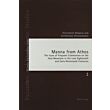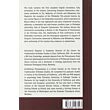Manna from Athos: The Issue of Frequent Communion on the Holy Mountain in the Late Eighteenth and Early Nineteenth Centuries
Hieromonk Patapios and Archbishop Chrysostomos
Publication Data: Oxford, United Kingdom/New York, NY: Peter Lang, 2006
Format: softcover
Number of Pages: 188
Dimensions (l × w × h): 22.5 cm × 15.0 cm × 1.1 cm
ISBN: 3‒03910‒722‒4
US-ISBN: 0‒8204‒7985‒3
Hieromonk Patapios and Archbishop Chrysostomos
Volume 2 of Byzantine and Neohellenic Studies
“St. Nikodemos the Hagiorite (1749–1809)[...and...]St. Makarios of Corinth (1731–1805)[...]in concord, extolling the necessity of the Eucharist for human deification (theopoiesis or theosis, in Greek Patristic nomenclature), emphasize that frequent Communion is indispensable for the realization of this soteriological goal. It is in their treatise Concerning Frequent Communion, the first full English translation of which constitutes the second part of this book, that they punctiliously set forth their argument, drawing on the witness of the Church Fathers, the deliberations of Church Synods and Councils, and the dictates of the Sacred Canons of the Orthodox Church. In nuce, Sts. Makarios and Nikodemos draw a clear connection between the dogmatic anthropology and soteriology of the Eastern Church (orthodoxy) and the practical mysteriological (sacramental) life in which the human being is actively deified and saved (orthopraxy). Beckoning us to a spiritual view of man that ‘expands his vision, his abilities, and, of course, his very natural attributes,’ they also call us, through frequent or continual Communion, to a vivifying union with God and the attainment of a lofty spiritual love that transforms ‘human cognitive and sensory frailty,’ restoring in the human person ‘the likeness of God.’ In so doing, they perfectly express the enduring spiritual traditions of the Orthodox Church.”
—“Section 1: The Decline in the Frequency of Communion in the Christian East”
CONTENTS
Acknowledgements
Part I: Commentary
Section 1
The Decline in the Frequency of Communion in the Christian East
Section 2
The Kollyvades Movement and the Advocacy of Frequent Communion
Section 3
The Treatise Concerning Frequent Communion
Part II: Translation of Concerning Frequent Communion
Chapter One
(i) Greetings to the Reader
(ii) Preface
Chapter Two
Exposition on the Lord’s Prayer
Chapter Three
(i) That It Is Necessary for Orthodox Christians to Partake Frequently of the Divine Body and Blood of Our Lord
(ii) That Frequent Partaking of the Holy Mysteries Is Beneficial and Salvific
(iii) That Delaying Communion Causes One Great Harm
Chapter Four
Responses to Thirteen Common Objections to Frequent Communion
Chapter Five
Epilogue
Bibliography
Format: softcover
Number of Pages: 188
Dimensions (l × w × h): 22.5 cm × 15.0 cm × 1.1 cm
ISBN: 3‒03910‒722‒4
US-ISBN: 0‒8204‒7985‒3
Hieromonk Patapios and Archbishop Chrysostomos
Volume 2 of Byzantine and Neohellenic Studies
“St. Nikodemos the Hagiorite (1749–1809)[...and...]St. Makarios of Corinth (1731–1805)[...]in concord, extolling the necessity of the Eucharist for human deification (theopoiesis or theosis, in Greek Patristic nomenclature), emphasize that frequent Communion is indispensable for the realization of this soteriological goal. It is in their treatise Concerning Frequent Communion, the first full English translation of which constitutes the second part of this book, that they punctiliously set forth their argument, drawing on the witness of the Church Fathers, the deliberations of Church Synods and Councils, and the dictates of the Sacred Canons of the Orthodox Church. In nuce, Sts. Makarios and Nikodemos draw a clear connection between the dogmatic anthropology and soteriology of the Eastern Church (orthodoxy) and the practical mysteriological (sacramental) life in which the human being is actively deified and saved (orthopraxy). Beckoning us to a spiritual view of man that ‘expands his vision, his abilities, and, of course, his very natural attributes,’ they also call us, through frequent or continual Communion, to a vivifying union with God and the attainment of a lofty spiritual love that transforms ‘human cognitive and sensory frailty,’ restoring in the human person ‘the likeness of God.’ In so doing, they perfectly express the enduring spiritual traditions of the Orthodox Church.”
—“Section 1: The Decline in the Frequency of Communion in the Christian East”
CONTENTS
Acknowledgements
Part I: Commentary
Section 1
The Decline in the Frequency of Communion in the Christian East
Section 2
The Kollyvades Movement and the Advocacy of Frequent Communion
Section 3
The Treatise Concerning Frequent Communion
Part II: Translation of Concerning Frequent Communion
Chapter One
(i) Greetings to the Reader
(ii) Preface
Chapter Two
Exposition on the Lord’s Prayer
Chapter Three
(i) That It Is Necessary for Orthodox Christians to Partake Frequently of the Divine Body and Blood of Our Lord
(ii) That Frequent Partaking of the Holy Mysteries Is Beneficial and Salvific
(iii) That Delaying Communion Causes One Great Harm
Chapter Four
Responses to Thirteen Common Objections to Frequent Communion
Chapter Five
Epilogue
Bibliography
Write Your Own Review






